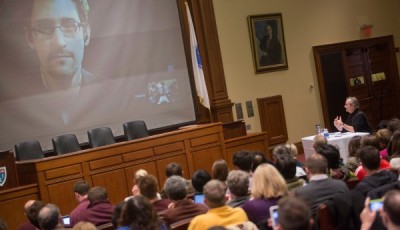The Ultimate Political Choice on Cyberspace
There are only 2 ways to keep cyberspace a quite and safe place: to securize it by military methods, or to design it by decentralizing values.
Decentralized doesn’t mean Balkanized. Balkanization is not an hypothetical consequence of geopolitical manoeuvres by bad governments, like the US Department of State would make us believe with its campaign on an Open Internet. Balkanization is a condition already occurring in US strategies and policies on networks. It’s a design method used by governments and IT corporations in order to keep cybernetic resources centralized. It’s also a legal framework directly produced and applied by US gov agencies, without undergoing any political exame. The latest demonstration comes from the Snowden-leaked documents recently published by The Intercept. In a 2004 paper by the NSA and the US Strategic Command, we find the definition of what is called “America’s cyberspace“.
America’s cyberspace is the combination of U.S. National Security Systems, Military Systems, Intelligence Systems, Federal Government Systems, Critical Infrastructure Systems and all other U.S. systems (private industry, academia and private citizens).
 It’s unrealistic that a US manager, a scientist, a citizen or even a politician, would give such a definition of the America’s cyberspace. But this and alike definitions produce design, policies and operations that affect industry, academia and private citizens as well as democratic institutions inside and outside cyberspace.
It’s unrealistic that a US manager, a scientist, a citizen or even a politician, would give such a definition of the America’s cyberspace. But this and alike definitions produce design, policies and operations that affect industry, academia and private citizens as well as democratic institutions inside and outside cyberspace.
Decentralized doesn’t mean Deregulated. Decentralization requires a very political choice, i.e., to politically regulate cyberspace. It requires laws, norms, codes; and enforcement authorities formally and substantially tied to democratic legitimation. Decentralization needs rules. The history of the Internet is the history of a long process of centralization driven by the ideology of the cybernetic laissez faire. Its critical functions management, infrastructures, source codes and contents have been undergoing through significant re-engineering processes aiming to centrally control cyberspace.
The result of such a level of Balkanization and Centralization is a less peaceful and safe cyberspace. It’s an escalation of multi-layered conflicts where, unlike the Smart Bomb theoretically aiming to avoid civil victims, people, their data and their devices are the weapons. Cyberspace weaponization occurring nowadays has already proved to be ruinous from both a technological and a political point of view. An effort in the direction of decentralizing solutions has to be made in order to assure a human friendly “intergalactic network”.




